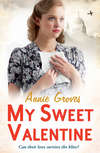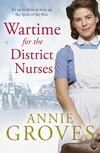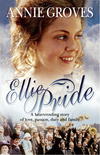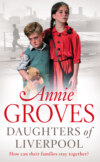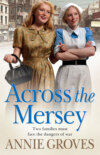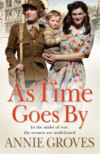Loe raamatut: «My Sweet Valentine»
My Sweet Valentine
ANNIE GROVES

Copyright
This novel is entirely a work of fiction. The names, characters and incidents portrayed in it are the work of the author’s imagination. Any resemblance to actual persons, living or dead, events or localities is entirely coincidental.
Published by HarperCollinsPublishers Ltd 1 London Bridge Street London SE1 9GF
First published in Great Britain by HarperCollinsPublishers Ltd 2012
Copyright © Annie Groves 2012
Cover design © HarperCollinsPublishers Ltd 2012
Annie Groves asserts the moral right to be identified as the author of this work.
All rights reserved under International and Pan-American Copyright Conventions. By payment of the required fees, you have been granted the non-exclusive, non-transferable right to access and read the text of this e-book on-screen. No part of this text may be reproduced, transmitted, downloaded, decompiled, reverse engineered, or stored in or introduced into any information storage and retrieval system, in any form or by any means, whether electronic or mechanical, now known or hereinafter invented, without the express written permission of HarperCollins e-books.
HarperCollinsPublishers has made every reasonable effort to ensure that any picture content and written content in this ebook has been included or removed in accordance with the contractual and technological constraints in operation at the time of publication.
Ebook Edition © December 2012 ISBN: 9780007419401
Version: 2017-10-09
Dedication
For Annie Groves’ readers
Contents
Cover
Title Page
Copyright
Dedication
One
Two
Three
Four
Five
Six
Seven
Eight
Nine
Ten
Eleven
Twelve
Thirteen
Fourteen
Fifteen
Sixteen
Seventeen
Eighteen
Nineteen
Twenty
Acknowledgements
Coming from Annie Groves in 2013
About the Author
Also by Annie Groves
About the Publisher
One
30 December 1940
‘Tilly, no! Stop! Don’t go any further. It’s too dangerous.’
‘I’m all right,’ Tilly Robbins assured her boyfriend, Drew, as the crowd surging towards St Paul’s Cathedral parted them. All around, the air was thick with smoke and the dusty aftermath of the previous night’s heavy bombing. Buildings were still burning, the acrid smell stinging the throats and the eyes of the onlookers. Even now, hoses were still being directed at the most intense fires.
The general noise of the Londoners, coming to see for themselves that St Paul’s was still standing, added to the rattle of fire engines’ wheels on cobbled road and the roar of persistent fires, made it almost impossible to hear oneself think, never mind hold a conversation, Tilly thought. Her earlier sense of adventure had been a little dissipated as the crowd swept her away from Drew and carried her along with it. Of course, she would never want Drew to think she was the helpless kind who couldn’t look after herself, but already she was missing his protective presence at her side and the warmth of his hand in hers. Soon, however, she managed to battle her way out of the crowd to stand in the shelter of a doorway whilst she waited for Drew to catch up with her. Turning, she waved and smiled at him. Relieved to see that Tilly was waiting for him, Drew waved back.
Then suddenly, a shower of burning sparks fell onto the crowd, followed by a piece of smouldering timber from a building. People started panicking, pushing and elbowing others to try to escape. Trapped in her doorway by the crush of bodies, Tilly couldn’t move. Several bricks fell to the ground nearby, one of them hitting her arm, whilst Drew struggled helplessly to get to her against the surge of the crowd moving the other way.
‘Watch out, the whole building’s going to go,’ Tilly heard someone yell.
People scattered in every direction. Frightened herself now, Tilly too started to push forward, trying to escape. Her chest was pounding; the air she was trying to breath was thick with dust and heat. Her nose was stinging from the burning smell. She had no idea where to run for safety as the bricks showered down. Right next to her a man was hit on the head by one of the bricks, staggering and then falling to the ground, blood pouring from his forehead. Automatically Tilly crouched down to try to help him.
Drew had been fixing his gaze on her as he fought to get to her side. Her sudden disappearance from sight had his heart slamming into his chest, until the crowd parted and he could see the cream knitted beret she was wearing on her dark curls.
‘Drew!’ Tilly knew she was trembling with relief as Drew reached her and pulled her close. Another fall of bricks had her ducking her head into his shoulder whilst he raised his arm protectively around her.
‘Come on, we’ve got to get out of here before the whole building goes,’ he urged her.
The man who had fallen was being helped to his feet by his friends. Drew was right, they needed to get away, but still Tilly hesitated, wanting to make sure the injured man was all right.
She had just pulled a couple of yards away from Drew when she heard him yelling frantically, ‘Tilly, no!’
The thunder of the fresh fall of bricks was terrifying. It held her paralysed where she was, right in their path. They were going to hit her. She was going to die, but still she couldn’t move. A terrible sense of the ice-cold inevitability of her fate gripped her. This was it. This was her time. It was no good trying to avoid it. She couldn’t escape.
She could hear Drew crying out, ‘Tilly! Tilly!’, his anguish making her heart beat faster but he was too far away to reach her.
Tilly looked towards him, all her love for him in her eyes.
Drew knew only that he had to save her. Miraculously, by some superhuman power he hadn’t known he possessed, he reached out for her, somehow finding the strength to pull her bodily out of the path of the falling debris, and away to safety. His grip on her was so hard that Tilly could feel the sharp pain of the force he had used right through her shoulder.
It wasn’t that pain, though, that was making her cry, as Drew held her tightly, whilst the bricks thudded down onto the pavement behind them. It was relief, Tilly recognised.
Drew had just saved her life.
She was trembling so much in the aftermath of her shock that she knew she was incapable of standing by herself. As he held her, she could feel his heart thudding, and hear his harsh straining for breath.
‘Oh, Drew, you saved me. You saved my life. You put your own life at risk for me,’ Tilly whispered, unable to hold back her tears.
‘My life is nothing without you in it, Tilly,’ Drew whispered back. If he’d lost her … It didn’t bear thinking about. He loved her so much. She was everything to him, this pretty little Londoner who had stolen his heart so completely.
Thankfully they clung together, both aware how close to death Tilly had been, silently sharing their own small miracle, looking at one another with all that they felt for each other in their eyes. There was no need for words. They were together, they were safe. At least for now. Held tight in Drew’s arms, Tilly felt vulnerable for the first time. Suddenly she was anxious to claim every second of life she could – to spend that time with Drew; to be with Drew. To be married to Drew, and soon, though she knew that her mother did not want that for her. Until this moment she had been relatively happy to accept her mother’s plans for her, but now that she had come face to face with the reality of loss and death, now when she was still shaking inside with the fear of what could have been lost, Tilly knew that somehow she must find a way to change her mother’s mind.
The incident, so potentially fatal for Tilly and Drew, was just another everyday wartime event in the lives of London’s citizens. A salvage team was already piling out of the truck that had pulled up close to the unstable building. Men were cordoning off the pavement and getting to work to make the building safe. The brief moments of panic and danger were over.
‘Come on,’ Drew said gruffly against Tilly’s ear. ‘Let’s get out of here.’
‘I still want to see St Paul’s,’ Tilly told him. ‘We said we’d meet the others there, and Mum will worry if we don’t turn up.’
‘She’d worry even more if she knew what I know,’ Drew told her grimly.
Tilly was right, though. Olive, her mother, would worry if they didn’t meet up, and then Olive wouldn’t trust him to take care of Tilly, and that was the last thing Drew wanted. He knew already that Tilly’s mother thought she was too young for a steady boyfriend, and he could understand why. It was up to him to prove Olive wrong and to show her that Tilly would be quite safe with him.
But there were things about him that Tilly still didn’t know. Things he hadn’t been able to bear to tell her in case they changed how she felt about him. He hated keeping secrets from her. He wanted her to know everything, but with every day that passed since they had declared their love for one another it got harder both to tell her and to not tell her. His guilt was an increasingly heavy burden on his conscience. He guessed exactly how Tilly’s mother would feel if she knew the truth about him. She would not like it at all.
‘Come on, then,’ he agreed, making himself focus on the present as he gave in to Tilly’s insistent tug on the sleeve of his sturdy Burberry mackintosh – a staple in the wardrobe of all serious Fleet Street newshounds. ‘But this time you stay right here at my side, and to make sure that you do …’
Drew took hold of Tilly’s hand and held it tightly in his own, earning himself a speaking look of tenderness and love.
Darling Drew. She was so lucky to have met him, Tilly thought happily. Her American was the most wonderful man, the most wonderful boyfriend … he would be the most wonderful husband. Tilly tried to squeeze down the happiness and excitement she felt at the thought of Drew as her husband … and herself as his wife. And they would be husband and wife, just as soon as she could convince her mother that she wasn’t too young to get married. Just because her mother had married young during the last war, and had then been widowed when Tilly had been a baby, that did not mean that the same thing was going to happen to her. She understood why her mother wanted to protect her, but she wasn’t a girl any more, she was a woman now. A woman who was deeply in love and desperate to spend every minute she could with the man she loved. Life was so precious. How strongly that had been brought home to her. They had so much to look forward to: their love, and the life they would share, the book that Drew planned to write about Londoners living through the war, the children they would have … She couldn’t wait for her life with him to start.
Standing waiting anxiously at the bottom of the street, with her back to St Paul’s, Olive spotted the young couple from several yards away. The sight of them openly holding hands caused her heart to sink. It wasn’t that she didn’t like Drew Coleman – she did – but Tilly was so young, too young, in Olive’s eyes, for the pain that she knew could come from loving someone in wartime if that love turned to loss. Drew might not be in uniform but in his job he was often out and in the thick of it, reporting on the air raids on London.
Initially Tilly had respected Olive’s wishes about not getting too involved with Drew, but since Christmas something had changed, and every day – or so it seemed to Olive, watching Tilly so anxiously – Tilly was making it plainer that she considered Drew and herself to be a courting couple. Olive only had to look at her now, openly holding Drew’s hand in the street, where she knew that Olive would see her, to know that.
It wasn’t that she couldn’t see that Tilly thought herself in love. It was just that she wanted to protect her from the pain that that love could bring if it was lost to her, and war brought the prospect of that kind of loss so much closer.
Now that mother and daughter had found one another in the crowd, Olive’s pretty face, so like her daughter’s, was creased with anxiety.
‘I don’t think we should have come,’ she told Tilly. ‘It’s so dangerous out here with all these buildings still burning and unsafe.’
‘We had to, Mum. We couldn’t not do,’ Tilly protested. ‘We all want to see for ourselves that St Paul’s is really still standing. We all said the same thing, even you.’
‘That was before I realised just how dangerous it was going to be,’ Olive Robbins replied.
Tilly’s ‘all’ referred to the three girls who lodged at Olive’s house in Holborn, and Olive’s friend Audrey, whose husband was the vicar at the church they attended.
‘And at least they didn’t get St Paul’s.’ Tilly looked towards the cathedral, her heart filled with a rush of pride and love. There was something so special, even mystical, about the sight of Wren’s masterpiece rising above the pall of smoke that must surely touch every Londoner’s heart. It was a wonder that the cathedral had been spared whilst so much had been destroyed and damaged around it. Fire crews had fought all night to save it, and Londoners had come out in their thousands to pay their own often silent tributes to its endurance and the bravery of their fellow citizens.
There was no need to say anything to her mother about what had happened earlier, of course, Tilly reflected. She worried so much about her as it was.
Hearing the note of determined cheerfulness in Tilly’s voice, Drew tucked her gloved hand into the pocket of his raincoat and held it firmly in his own, giving it a small private squeeze. In return Tilly looked at him with eyes luminous with emotion. Witnessing their small exchange Olive’s heart sank even further.
Drew was a good man; he would listen to maternal reason, she felt sure, but Tilly was a different matter. Olive was normally proud of her daughter’s spirited independence. She knew from her own experience of life that a woman sometimes needed to be independent, but Tilly could be very strong-willed and fearless. She had the courage that came from never having had to face the really bitter cruelties of life. Olive wanted her to keep that courage. She wanted to protect her from the pain of life’s cruelties. Marriage at eighteen in the middle of a world war would do the opposite of protecting her. Not that Tilly had said anything to her directly about marrying Drew, but Olive suspected that it was only a matter of time before she did. And when she did Olive knew that she was going to have to stand firm and refuse her permission.
Marriage … a child … widowhood – Olive knew for herself all about the pain and loneliness that brought.
Loneliness? She hadn’t been lonely in her widowhood. She had had her mother-in-law and father-in-law to live with and then later to care for. She had had Tilly to love and cherish. She had had a busy life and one that now, with the war and her WVS work, was even busier. Indeed, it was thanks to the WVS that she had made what was turning out to be such a good growing friendship with Audrey Windle, the vicar’s wife.
It was a life without the kind of love that came from having a husband, though; a man to turn to, to share things with, to laugh with, to love …
Olive could feel her face starting to burn at the dangerous direction of her private thoughts.
Mother and daughter looked at one another, Tilly’s chin lifting with determination – which to Olive looked like defiance – before she deliberately moved closer to Drew and nestled into his side.
Once, not so very long ago, it would have been her side that her daughter would have run to, Olive reflected.
Standing with Drew, Tilly surveyed the scene. Whilst the Germans hadn’t managed to destroy St Paul’s, the fires resulting from the bombing raid had damaged much of the heart of the city. Those streets with their ancient religious names – Paternoster Row and Curie Street – the solid guildhalls built by its rich merchants, its learned seats of justice, all had suffered damage.
Initially it had been the photograph in the Daily Mail of St Paul’s seeming to float above the smoke of the fires that had drawn Olive and Tilly, along with so many other Londoners, to come to see for themselves that the cathedral was indeed still standing and not just a mirage.
In the dull light of the grey day Tilly could still see the fairer tips of Drew’s mid-brown hair, a legacy of the outdoor life at American summer camps during his growing-up years, Drew had told her. They had lived such different lives; grown up in such different circumstances. She was an only child; Drew had four sisters. She had only her mother; Drew had both his parents. But the differences between them didn’t matter. What mattered was how they felt about one another. Their love was still new enough for Tilly to feel almost giddy with a mixture of joy that they had met and horror at the unimaginable awfulness of them never having met at all.
‘At least Article Row has escaped being bombed,’ Drew offered comfortingly now.
‘Yes, thank heavens,’ Tilly agreed. She didn’t know by what good fortune her own home at number 13, and in fact the whole of Article Row, had been spared the conflagration. She was just glad that they had.
Prior to the start of the war Article Row had been an immaculately neat-looking and well-cared-for row of houses that wound its way between closely interweaving streets. Chancery Lane lay to the west of the Row, Farringdon Road to the east, Fleet Street to the south and High Holborn and Holborn Viaduct to the north.
The residents of Article Row still did their best to keep it looking as it should, of course, especially Nancy Black, Tilly’s mother’s next-door neighbour, and the sharp-tongued busybody of the Row, but Hitler’s bombs had destroyed so much of the city that even those buildings that weren’t damaged had been afflicted by brick dust and greasy smuts, making everywhere look careworn and down at heel.
Article Row comprised only fifty houses, built by the grateful eighteenth-century client of a firm of lawyers in the nearby Inns of Court, whose fortune had been saved by the prompt action of a young clerk articled to those lawyers. The three-storey houses curved down one side of the Row facing the rear of the ivy-clad windowless walls of the business premises that backed onto Article Row, making it something of a quietly genteel backwater, its status much prized by those residents, such as Mrs Black, to whom such things were important.
It wouldn’t have taken much for the flames of nearby burning buildings to be driven towards Article Row, and to consume the buildings there as they had done so much else, Tilly reflected. She gave a small shiver at the thought of suffering the loss of her home. She knew how much number 13 meant to her mother. There was something special about Article Row and the small close-knit community who lived there. Tilly felt even more fond of it now, with Drew living there as well, lodging as he did with one of the neighbours, Ian Simpson. Ian’s wife and their children had evacuated to the country at the start of the war. Ian was a print setter, working for the Daily Express on nearby Fleet Street, which was how he had originally come to meet Drew.
This new bombing raid on the city was a dreadful end to a dreadful year, and by all accounts they had an even bleaker new year ahead of them as wartime hardship bit ever deeper into their lives.
It had been trying to snow slightly on and off all day, forlorn white flakes outnumbered by the soot and cinders still raining down from the sky. Now one of them landed on Tilly’s face to lie there for a second before it was washed away by the tears she barely knew she was weeping.
‘That’s right, missie, if they’d hit St Paul’s it would have taken the heart out of everyone in London, and not just the city itself,’ said an elderly man emotionally, leaning heavily on his walking, stick, medals from another war barely gleaming on his chest in the grey late afternoon light.
It was that kind of day: the kind when complete strangers spoke and turned to one another in comfort and in hope that somehow, like St Paul’s itself, they would be saved – delivered from the awfulness of war.
A heavy pall of smoke and the darkening sky combined to create the illusion that even those buildings still standing were as fragile as cardboard, shifting on every shocked breath of the onlookers. Watchers and workers alike were pulling scarves up round their noses and mouths to block out the raw throat-burning smell and taste of smoke-filled air.
‘I shall never forget this as long as I live,’ Tilly told Drew. ‘And not just the way everything looks, but the awful, acrid, destructive smell too. I’ll remember it for ever. First Coventry’s cathedral and now this. Do you think Hitler is deliberately targeting our cathedrals?’
‘I think he’s getting desperate enough to know that the only way he’s going to win this war is to destroy the spirit of the British people,’ Drew told her, his arm tightening round her when she moved closer to him.
Tilly reached up to touch the chain hidden beneath her plum-coloured polo-necked sweater, from which hung the ring Dew had secretly given her on Christmas Eve – Drew’s own graduation ring from his American university. She might only be eighteen, Tilly thought rebelliously as she felt the comforting weight of Drew’s ring against her skin, but the war meant that people her age were growing up fast. Surveying the full horror of the aftermath of the air raid, Tilly’s heart ached for those whose lives would be changed for ever. The very thought of anything happening to her Drew made her heart pound with anxiety.
In an attempt to distract herself she asked him, ‘Will you write about this in one of your newspaper articles?’
‘Yes,’ he confirmed. ‘And about how brave you all are.’
‘You’re brave too, because you’re here with us when you don’t need to be, when you could be safe in America,’ Tilly reminded him.
‘No,’ Drew said softly, shaking his head. ‘There is only one place I can be, Tilly – only one place I want to be – and that is here with you.’
‘Oh, Drew.’
For a few precious seconds the intensity of their love wrapped a protective coat around them that excluded everyone and everything else. Within that protection Tilly gave Drew a look of burningly passionate love that made his heart turn over – with male desire for her, yes, but also with a need to protect her from that desire.
To distract herself from her anxiety over Tilly, Olive turned towards her friend Audrey Windle, who had stood back when Tilly and Drew had first appeared. She had seen the look on Olive’s face and guessed she was anxious about her young daughter and the handsome American reporter.
Now as they stood side by side in their WVS uniforms, Olive asked Audrey with genuine concern, ‘Have you had any news from your nephew?’
‘Yes, thank heavens,’ the vicar’s wife responded. ‘His plane was shot down over the Channel, as you know, Olive, but we heard only this morning that, miraculously, a naval vessel saw his parachute and was able to rescue him. He’s got a broken leg, mind, so he’ll be out of action for a while.’
She paused and then offered, ‘Tilly’s young man seems nice. I know the children at the Christmas party were all thrilled with the presents he gave them when he played Father Christmas.’
‘He is nice,’ Olive felt obliged to confirm truthfully. ‘And generous. It was lovely of him to think of doing that for the children.’ Her maternal anxiety couldn’t be abated, however, and before she could stop herself she was saying anxiously, ‘Tilly is so young, though, and there’s a war on. Even if there wasn’t, he’s American; ultimately he will go back there. It’s his home, after all.’
Audrey Windle gave Olive a sympathetic look. Then, in an effort to distract her, she gestured towards a WVS mobile canteen, which was parked close by and manned by three very busy WVS workers.
‘Do you think we should offer to give them a hand? They look very busy.’
‘Yes. I was just going to ask you the same thing.’ Olive knew hard work was always a good antidote to worry. She’d still be able to keep an eye on Tilly from the mobile canteen, and it went against the grain with Olive not to offer to help fellow members of the Women’s Voluntary Service if she thought she could be useful.
‘Want some help? I should say we do,’ the woman behind the counter told Olive and Audrey fervently. ‘It’s the firemen I feel the most sorry for. Parched, they are, after the fires they’ve had to put out.’
Olive nodded, quickly getting to work alongside Audrey. It was a small enough thing to do, set against what the fire and rescue services were doing – the providing of cups of hot tea – but everyone who worked in the WVS knew how much that homely brew meant to both the bombed-out and frightened, and those who were desperately trying to protect and save them.
‘Ta.’ One of the firemen took the cup of tea Olive had just poured for him, his helmet pushed back to reveal his soot-smeared face.
After draining the tea almost in one gulp he told her grimly, ‘He’s good at planning, Hitler is, you’ve got to give him that. Coming in at night when the Thames’s tide was at low ebb and then knocking out one of the main pumping stations first so that there wouldn’t be enough water pressure for our hoses. Lost a hell of a lot of buildings we could have saved, that did, never mind the poor souls that was in them that’s now under them. We’ve had to send one of our lads home. Found a couple of kids in one of the buildings – both of them gonners – same age as his own kids. He wouldn’t have it that we couldn’t do anything for them. Had to be dragged off in the end …’
‘Those men are saints,’ Audrey breathed fervently to Olive once the firemen had gone.
‘Most of them are, but sadly there are some bad apples. Sergeant Dawson told me that they’ve had to investigate cases of fire and rescue workers – and men in the Home Guard – helping themselves to things from damaged buildings.’
‘Yes, I’d heard that as well,’ the vicar’s wife said sadly. Then, changing the subject: ‘It’s such good news, though, isn’t it, about Sergeant and Mrs Dawson giving that young boy Barney a home?’
‘Yes it is,’ Olive agreed warmly.
Barney was a bit of a tearaway, and worse – at least according to Olive’s complaining neighbour, Nancy. After the death of his mother and grandmother Barney had been roaming the streets and constantly escaping from official care because he was afraid that when his father got leave from the army, he wouldn’t be able to find him. His parents had been separated, and Olive had been able to tell from the start that Sergeant Dawson, who lived at number 1 Article Row, had a bit of a soft spot for the boy.
When Barney had run away from the second children’s home that had taken him in and had been found begging in the streets with a group of older boys, at Sergeant Dawson’s suggestion and with the agreement of the local authorities it had been arranged that Barney would move in with the Dawsons until such time as Barney’s father was able to take charge of his son once again.
‘I just hope that Mrs Dawson will be able to cope,’ Audrey continued with some anxiety. ‘I wouldn’t say that to anyone else, Olive, and especially not Nancy, knowing how unkind she can be.’
‘You needn’t worry that I’ll say anything to anyone else,’ Olive assured her, ‘but it’s no secret to those who lived in Article Row when the Dawsons’ son was alive that it hit Mrs Dawson particularly hard when they lost him.’
‘The vicar and I came here after their little boy’s death, but Mrs Dawson was so much of a recluse I remember that I didn’t even realise that Sergeant Dawson was married at first.’
‘It’s going on for ten years now since they lost him. So sad … He was always very poorly, and Mrs Dawson devoted every minute to him. But I’m sure that Sergeant Dawson wouldn’t have offered Barney a home if he felt it would upset his wife in any way.’
‘You’re right,’ Audrey agreed. ‘I hope it works out well for them all. Sergeant Dawson is such a good sort – look at the way he taught you and Anne to drive so that we could take up Mr Lord’s offer of his son’s van for WVS use.’
Olive nodded vaguely. She was listening to Audrey but her attention was really on Tilly and the rest of ‘her girls,’ as she had come to think of her lodgers.
Sally, in her nurse’s cape, no doubt thinking of her young man, George, a doctor working under the plastic surgeon Mr Archibald MacIndoe in a hospital in East Grinstead, where they did their best to repair those men who had been burned in the course of duty. Agnes, the orphan who had come to lodge at number 13, now newly engaged to Ted Jackson, who, like her, worked on the London Underground; she was still at the stage of gazing dreamily at her pretty little engagement ring. And then of course Dulcie, from Stepney in the East End, with her brash bold cockney ways and chippy exterior, which, as Olive knew, concealed an inner vulnerability. They had all three come to be extra daughters to her over the months they had lodged with her. It seemed odd to think now that she had viewed the thought of taking in lodgers as an unwelcome necessity. Now she wouldn’t have wanted to be without her girls for anything, and the house would seem empty without them.
